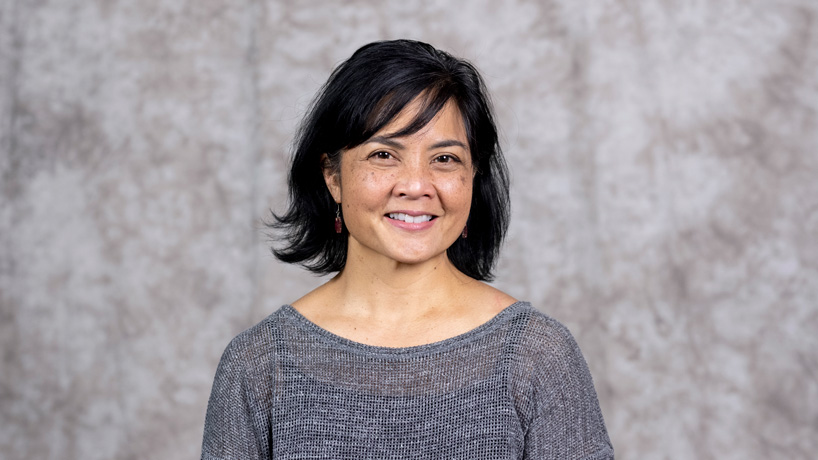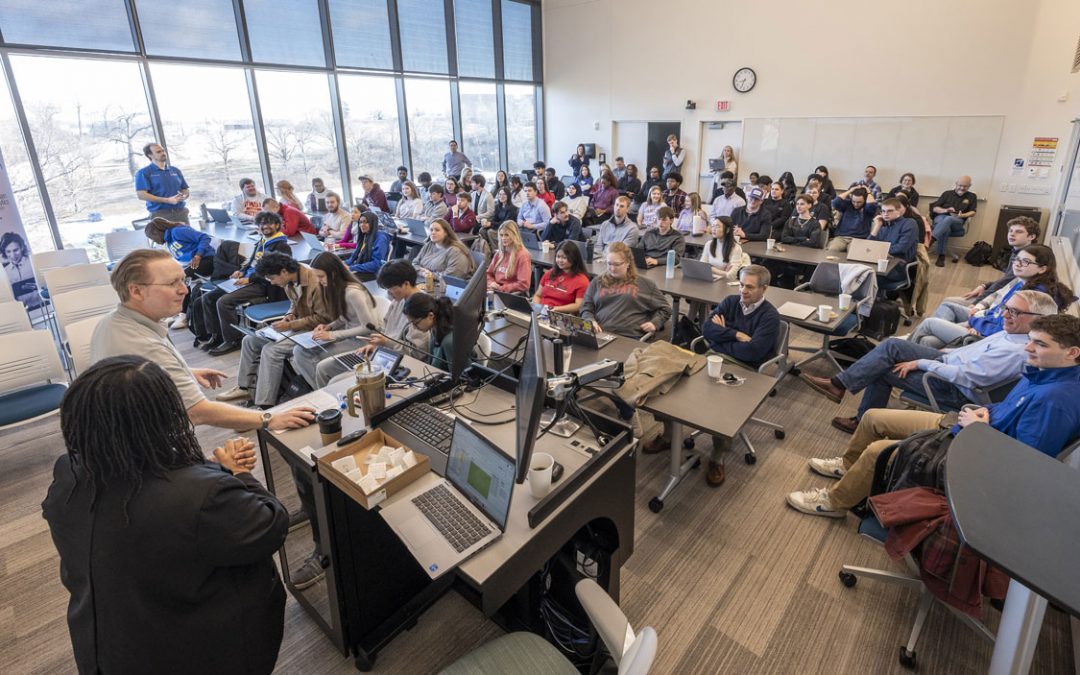
Professor Joanna Mendoza, a member of the Arianna String Quartet, was named the 2021 recipient of the Artist Teacher Award from the Missouri chapter of the American String Teachers Association. (Photo by August Jennewein)
Joanna Mendoza has earned acclaim for her performances across the United States and abroad as part of the Arianna String Quartet.
The group, in-residence at the University of Missouri–St. Louis since 2000, has played for National Public Radio’s “Performance Today” and for “Live from Music Mountain,” in shows broadcast to 125 stations in the U.S. and to 35 countries.
Jerry Dubins, writing in Fanfare, suggested ASQ’s 2017 recording of the “Beethoven: The Middle Quartets” “may just be the greatest performances of Beethoven’s middle quartets in recorded history.”
But performing on the viola with the ASQ has been only one part of Mendoza’s work since joining the quartet in 2008. She is also a professor in UMSL’s Department of Music and has helped train hundreds of viola students, both in that role, in her private studio and as an invited instructor at colleges and conservatories around the globe.
The Missouri chapter of the American String Teachers Association recently conferred its Artist Teacher Award on Mendoza for 2021. The Artist Teacher Award is presented to a performing musician who has taught in addition to their career as a performer and has made a significant contribution to the education of string students in the state of Missouri.
“I was just so honored,” Mendoza said. “There are so many wonderful teachers in Missouri, and I know I’m in good company with the other previous winners, so I felt very lucky and humbled to be recognized.”
Performing and teaching have always gone hand in hand for Mendoza, who was trained at the University of Wisconsin and The Juilliard School and served on the faculties at West Texas A&M University and the University of Oklahoma before coming to UMSL.
“I think that they complement each other,” Mendoza said. “I am glad I don’t have to choose. I know that I’m a better performer because of teaching, and I know that I’m a better teacher because I perform.”
Mendoza typically works closely with as many as 10 students each year at UMSL, in addition to teaching a course in music history. She often begins training students on the viola when they start out as college freshmen and continues to mentor them through the completion of their degrees. Her students aspire to teach and direct orchestras in public schools, open private studios or advance to graduate school to train to be professional performers.
“What I find really rewarding about it is really seeing that trajectory of somebody –seeing their improvement and how their interest can really deepen,” Mendoza said. “Everyone’s story is so different, with the challenges they face and the strengths that they have. It’s really nice to be a witness to that and to be part of their development.
“It can also be frustrating because you don’t always know for sometimes a really long time what effect you’ve had. Those relationships are ongoing for many, many years.”
Students in Mendoza’s viola studios have gone on to continue their musical studies at esteemed institutions such as The Juilliard School, Rice University, the Peabody Institute of Music, Indiana University, Northwestern University, DePaul University, the University of California-Santa Barbara, University of North Carolina-Greensboro and East Carolina University.
They also have attended summer festivals such as Madeline Island Chamber Music, Music Academy of the West, Colorado College Music Festival, Brevard Music Festival, the String Academy at Indiana University and Center Stage Strings at the University of Michigan.
Mendoza has had to adapt her teaching methods during the COVID-19 pandemic, working with her students over Zoom sessions and providing feedback on submitted recordings instead of being able to move shoulders and adjust angles during in-person practice sessions.
She and the other members of the Arianna String Quartet have also stayed close to home instead of their usual travel schedule. In past Januarys, they’ve performed and offered instruction at South America’s largest summer music festival in Santa Catarina, Brazil.
When life returns to normal, Mendoza envisions incorporating some the tools tested during the pandemic into her teaching.
“It’s been really nice for them to do all this recording because they listen back and hear themselves in a different way,” Mendoza said. “In the future using both methods – prerecording as well as in-person, I think could really be beneficial.”














